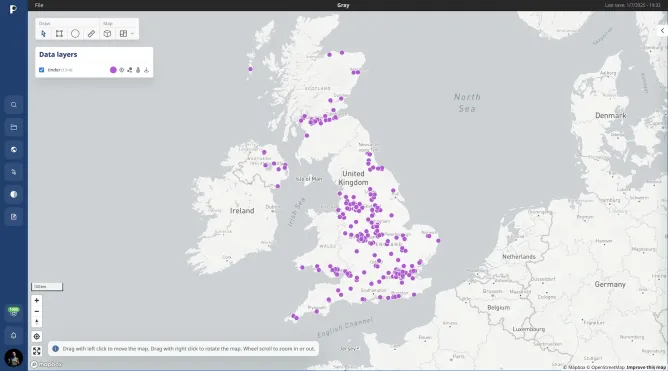A significant data breach at location data broker Gravy Analytics has sent shockwaves across the globe, exposing the privacy of millions. The breach, stemming from a hack into Gravy Analytics’ systems, has revealed how smartphone apps—ranging from health and fitness to dating and transit—can unwittingly betray their users by sharing precise location data.
This leak has uncovered tens of millions of data points detailing where people live, work, and travel, raising serious concerns about privacy and security. With sensitive information now in the hands of a hacker, the potential consequences are staggering.
What Happened?
Last weekend, news broke that a hacker had infiltrated Gravy Analytics’ systems and posted screenshots of stolen location data on a Russian-language cybercrime forum. The hacker claimed to have acquired several terabytes of consumer location data collected through various popular smartphone apps. Norwegian broadcaster NRK reported that Unacast—the parent company of Gravy Analytics—notified authorities of the breach after discovering the intrusion on January 4.
Unacast, which merged with Gravy Analytics in 2023, has positioned itself as one of the world’s largest collectors of location data, reportedly tracking over a billion devices daily. The breach, facilitated by a stolen Amazon cloud key, highlights critical vulnerabilities in how data brokers safeguard their vast troves of sensitive information.
What We Know So Far
As of now, researchers have analyzed a sample of the leaked data, revealing more than 30 million location data points. The dataset includes:
- Sensitive Locations: Devices have been tracked at high-profile locations such as The White House, the Kremlin, Vatican City, and military bases worldwide.
- Personal Privacy Risks: Data shows individuals’ travel patterns, such as a person’s journey from New York to their home in Tennessee.
- LGBTQ+ Vulnerability: The dataset includes data from apps like Grindr, posing grave risks to LGBTQ+ users in countries where homosexuality is criminalized.
Alarmingly, this data could also be used to identify individuals serving in military roles or those working in high-security environments, posing significant risks to national security.
The Dark Side of Location Data
This breach sheds light on the often-overlooked role of data brokers like Gravy Analytics in amassing and monetizing sensitive information. Gravy Analytics sources much of its data through real-time bidding, a process that occurs during online advertising auctions. When advertisers bid to deliver ads to users, they gain access to device information—including IP addresses, device types, and, in some cases, precise location data. This information, often shared unknowingly by users, forms the backbone of data brokers’ operations.
Even apps that deny direct business ties to Gravy Analytics—such as FlightRadar, Tinder, and Grindr—may inadvertently share user data through ad-serving mechanisms. The advertising industry’s opacity means that even app developers themselves may not fully understand how their users’ data is being collected and shared.
Privacy Advocates Sound the Alarm
Data privacy experts have long warned about the dangers posed by data brokers. The risks extend beyond personal privacy to national security. In this breach, researchers discovered location data tied to sensitive government and military facilities. For instance, the overlap of stolen data with known Russian military bases revealed the movements of individuals potentially serving as military personnel.
Baptiste Robert, CEO of digital security firm Predicta Lab, emphasized the ease with which this data can be used to deanonymize individuals. In one instance, Robert demonstrated how the dataset could track a person’s movements from a metropolitan area to their home.

A Tipping Point for Regulation?
This breach comes on the heels of increased scrutiny of Gravy Analytics and its practices. Recently, the Federal Trade Commission (FTC) banned Gravy Analytics and its subsidiary Venntel from collecting and selling Americans’ location data without consent. The FTC accused the companies of tracking individuals to sensitive locations like healthcare clinics and military bases, violating privacy rights.
However, this breach highlights the urgent need for stronger global data protection regulations. Companies must be held accountable for the security of the data they collect, and individuals must be empowered to safeguard their privacy.
How to Protect Yourself
Ad auctions happen on nearly every website and app, but there are steps you can take to minimize your exposure to advertising surveillance:
1. Use an Ad-Blocker:
Ad-blockers or mobile content blockers can prevent ad code from loading, reducing your exposure to ad-based tracking.
2. Adjust Device Settings:
- For Apple Users: Go to your device’s “Tracking” settings and switch off app tracking. This ensures your device’s unique advertising identifier is hidden.
- For Android Users: Navigate to the “Privacy” section in your settings and disable or reset your advertising ID. This prevents apps from linking your data to your identity.
3. Limit Location Access:
Restrict apps from accessing your precise location unless absolutely necessary. This reduces the granularity of data shared with advertisers.
The Path Forward
This breach is a sobering reminder of the risks inherent in our increasingly connected world. As data brokers amass ever-growing troves of sensitive information, the stakes for privacy and security have never been higher. Governments, regulators, and individuals must work together to demand greater transparency, accountability, and safeguards to protect personal data.
For now, the best defense is vigilance. By taking proactive steps to limit ad surveillance and sharing only what is necessary, you can reduce your digital footprint and safeguard your privacy in an era of unchecked data collection.










